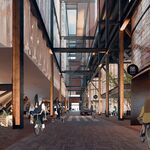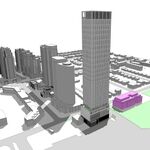TFC
Active Member
Does anyone know whether the bus platforms at this new bus terminal have a snowmelt system? I'm really hoping they did and we won't end up with ION-esque platforms caked in salt.
University Ave needs a serious upgrade. I always thought the public realm between Laurier and Waterloo was incredibly lacking. At least there’s more density now!
Can the signals be moved further west?Metrolinx has said that signal sighting will be a concern if they use the entire length of the platform over King Street. The west end of the train will be close enough that reading the signals at Kitchener West will be difficult. This is also why they will be closing the level crossing at Duke.
Dan
No. There's a spur immediately west of the overpass.Can the signals be moved further west?
Does the signal have to be before the switch? And the one for the north track can still be moved, no? It seems a bit silly to block off a road and move the platforms further away from the LRT transfer because of a signal.No. There's a spur immediately west of the overpass.

In this case, yes, the signal needs to be before the switch - it guards it.Does the signal have to be before the switch? And the one for the north track can still be moved, no? It seems a bit silly to block off a road and move the platforms further away from the LRT transfer because of a signal.
Metrolinx has said that signal sighting will be a concern if they use the entire length of the platform over King Street. The west end of the train will be close enough that reading the signals at Kitchener West will be difficult. This is also why they will be closing the level crossing at Duke.
Dan
Those signals are not interlocking signals, and so are allowed to be passed even if the signal is showing red (CROR rule 436 or 437). The one at Kitchener is an interlocking, and thus can only be passed when red under very specific circumstances.This doesn't make sense to me - the signal gantry west of King Street is about 20m past the west edge of the bridge structure over King Street, but there are a number of stations along the Kitchener Line alone where the signal gantry is closer or similarly spaced, including west of Malton, east of Etobicoke North, and north of Bloor.
Wild speculation on my part and I can't remember if all the studies are done. Stage 2 funding from the province and feds?
This is the kind of well-intentioned but poorly implemented redesign which is sadly common in Ontario. I suspect that this type of half-thinking is also why Toronto's vision zero safety program has not improved safety at all.They are coming within the decade (phased), approved last year was the University Avenue Gateway Strategy which covers beyond just the universities. Details and concepts can be found here.
No concrete plans, but there seems to be a large focus on public realm activation, which is a spot that I also felt needed a lot of enhancement being this once suburban stroad is now a student downtown lined with many businesses and apartments.
King/University Currently:
Concept from the Strategy document:
View attachment 373449
The glass shelters are heated, and platforms 3-6 each have two!It's hard to judge based of these pictures, but the least they couldve done is provide more shelter space from the elements. As far as im concerned this just looks like a glorified bus stop.




